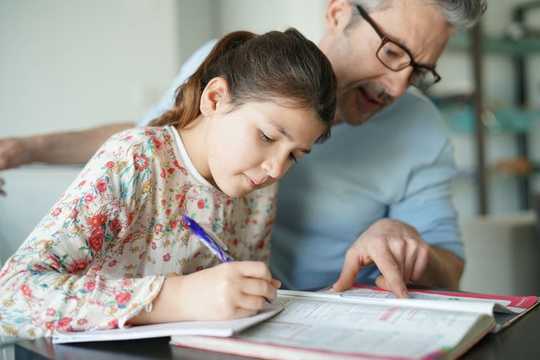
When their kids get older, parents should try to phase out homework help. goodluz/Shutterstock.com
Schools across the country encourage parents to help their children with homework.
Parents are listening. Helping with homework is one of the most common things that parents say they do to support their children’s learning.
Many experts have found that helping with homework cultivates positive learning behaviors, reinforces class material and signals to children that their education is important. The federal Department of Education says that parents play an important role in their children’s learning when they help with homework.
Yet parents often hear through the media that helping with homework may not be worth it. After seeing headlines such as “Why It’s So Important You Never Help Your Kids With Their Homework” and “Don’t Help Your Kids With Their Homework,” moms, dads and other caregivers can be left wondering whether they should even bother.
I’m a professor of education policy. Together with sociologist Angran Li, I set out to make sense of this conflicting guidance.
Cause or consequence?
The basis for claims that parental help with homework can be bad for students comes from research examining national surveys. These studies find that frequent homework help from parents is associated with lower test scores.
But this finding does not necessarily mean that moms and dads do harm when they help with homework. When children are struggling in school, parents may step in to help more often. That is, frequent homework help from parents might not be the cause of problems, but rather, coincide with them.
My colleague and I wanted to see if this was the case.
To find out, we studied data from an important nationally representative survey administered by the federal government – the Early Childhood Longitudinal Study. We found that low-achieving children were far more likely to receive frequent homework from parents.
And importantly, after we factored in children’s achievement levels, help with homework from parents was no longer associated with lower test scores.
Other considerations
While this finding was insightful, we figured that the effect of homework help from parents on student achievement might also be influenced by many other characteristics.
So we used a statistical technique that would account for many overlapping factors, such as how well parents and their children get along, the number of siblings, and behavior at school.
Our results also indicated that children with low test scores benefited the most when their parents frequently helped with homework.
In other words, calls for all parents to stop helping with homework could end up hurting some children.
In addition, one common concern is that only affluent and highly educated parents have the time and resources to help their children with homework regularly. We find little evidence to support this presumption. On national surveys, low-income and minority families report helping their children with homework frequently. And this was also true in our study.
Quality counts
It is important to point out that our study looked at the frequency of homework help from parents. However, evidence suggests that the quality of homework help also matters. Parents can make a difference through warm encouragement and a positive outlook and by communicating high expectations to children.
The effectiveness of homework help also seems to increase when parents foster independent learning behaviors. When helping with homework, parents should avoid trying to control the process and should also resist the temptation to complete assignments for their kids. Instead, they should let their children figure out answers on their own while offering helpful hints and positive feedback as needed.
Although parents should always consider their child’s individual learning needs, researchers say that parents should gradually reduce homework help as their children grow older, probably phasing out direct assistance with homework by the time their children reach high school. Parents can also seek advice from teachers and other school staff on how to make homework support engaging and attuned to their child’s learning needs.
Blanket statements about whether homework help is simply good or bad can be misleading. Under the right circumstances, parents can help their kids learn more when they help with homework.
About The Author
Daniel Hamlin, Assistant Professor of Educational Leadership and Policy Studies, University of Oklahoma
This article is republished from The Conversation under a Creative Commons license. Read the original article.

Related Books:
Here are 5 non-fiction books on parenting that are currently Best Sellers on Amazon.com:The Whole-Brain Child: 12 Revolutionary Strategies to Nurture Your Child's Developing Mind
by Daniel J. Siegel and Tina Payne Bryson
This book provides practical strategies for parents to help their children develop emotional intelligence, self-regulation, and resilience using insights from neuroscience.
Click for more info or to order
No-Drama Discipline: The Whole-Brain Way to Calm the Chaos and Nurture Your Child's Developing Mind
by Daniel J. Siegel and Tina Payne Bryson
The authors of The Whole-Brain Child offer guidance for parents to discipline their children in a way that promotes emotional regulation, problem-solving, and empathy.
Click for more info or to order
How to Talk So Kids Will Listen & Listen So Kids Will Talk
by Adele Faber and Elaine Mazlish
This classic book provides practical communication techniques for parents to connect with their children and foster cooperation and respect.
Click for more info or to order
The Montessori Toddler: A Parent's Guide to Raising a Curious and Responsible Human Being
by Simone Davies
This guide offers insights and strategies for parents to implement Montessori principles at home and foster their toddler's natural curiosity, independence, and love of learning.
Click for more info or to order
Peaceful Parent, Happy Kids: How to Stop Yelling and Start Connecting
by Dr. Laura Markham
This book offers practical guidance for parents to shift their mindset and communication style to foster connection, empathy, and cooperation with their children.






















